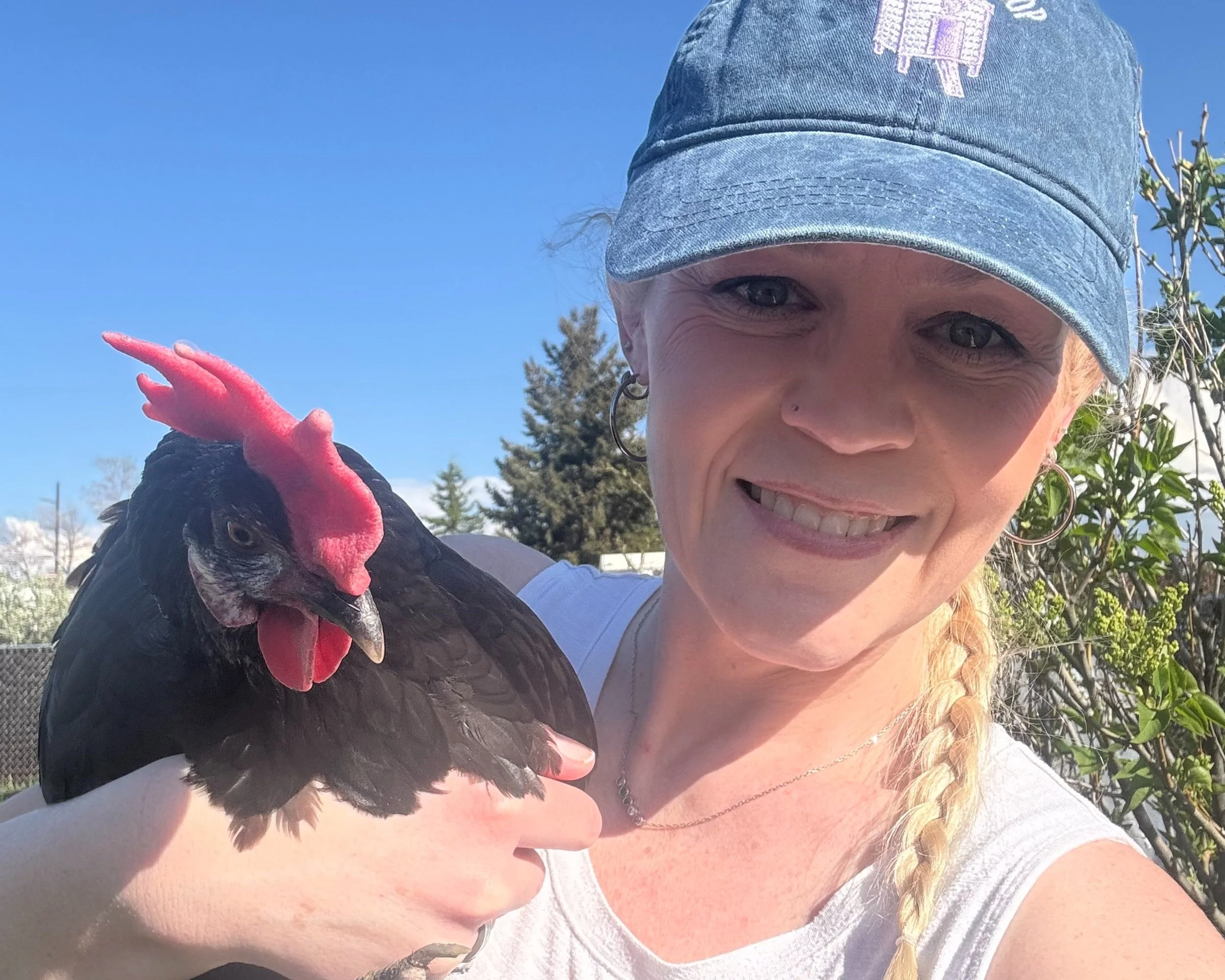The Healing Power of Animals: How Pets Boost Mental Health
Pictured is Lindsey’s bestest boy, Sir Killian, the very distinguished retired therapy dog.
In today’s fast-paced, disconnected world, mental health challenges like anxiety, depression, and loneliness are on the rise. Amidst the search for effective coping strategies, one solution stands out for its simplicity and profound impact: caring for animals. Whether it’s the wagging tail of a dog, the soothing purr of a cat, or the gentle cooing of a chicken, animals have a unique ability to lift our spirits and nurture our mental well-being. Decades of research confirm that pet ownership and animal care can significantly improve mental health outcomes, offering emotional support, reducing stress, and fostering a sense of purpose. In this blog post, we’ll explore the science behind the human-animal bond, the mental health benefits of caring for pets, and practical tips for integrating animals into your life responsibly — all backed by peer-reviewed studies and expert insights.
The Human-Animal Bond: A Foundation for Mental Health
The connection between humans and animals dates back thousands of years, evolving from survival-based relationships to deep emotional bonds. This human-animal bond is the cornerstone of why caring for pets can enhance mental health. According to a 2016 study published in Anthrozoös, interactions with animals trigger the release of oxytocin, often called the “love hormone,” which promotes feelings of trust, bonding, and relaxation (Beetz et al., 2016). This biochemical response helps explain why stroking a pet feels so calming.
Beyond oxytocin, animals provide non-judgmental companionship, a critical factor for mental health. Unlike human relationships, which can sometimes be complex or strained, pets offer unconditional love and acceptance. A 2019 study in Journal of Psychiatric Research found that pet owners reported lower levels of loneliness and social isolation compared to non-pet owners, particularly among older adults and individuals living alone (McNicholas et al., 2019). For those struggling with mental health conditions, this companionship can be a lifeline, offering comfort during difficult moments.
I have seen this disarming bond in action a multitude of times in my work with humans. Before his retirement due to age, I partnered with a wonderful Newfoundland therapy dog, Sir Killian. Nothing made my clients feel safe the way he did by touching his foot to the client’s foot, and letting them guide how much animal interaction was brought into session. I even had one client who preferred sessions on the floor so they could play with his ears while processing distressing experiences!
Stress Reduction: Pets as Natural Therapists
One of the most well-documented benefits of caring for animals is stress reduction. Chronic stress is a major contributor to mental health issues like anxiety and depression, and interactions with pets may act as a natural stress reliever. A 2017 study conducted at Washington State University found that just 10 minutes of petting a dog or cat significantly lowered cortisol levels, the body’s primary stress hormone, in college students (Pendry & Vandagriff, 2017). This effect is particularly valuable in high-pressure environments, such as workplaces or academic settings.
Caring for animals also encourages mindfulness, a practice known to alleviate stress. Feeding, grooming, or playing with a pet requires focus on the present moment, diverting attention from intrusive thoughts or worries. For example, walking a dog not only provides physical exercise but also exposes owners to nature and fresh air, both of which are linked to improved mood and reduced anxiety (Hartig et al., 2014). These small, routine acts of care create a sense of calm and stability, grounding individuals in their daily lives.
I have had the privilege of witnessing the grounding power of animals first-hand with my own sons. Like many families in SW Montana, we keep a small flock of backyard chickens. My oldest son has found that when his middle school math homework is just a bit more than he can handle, a few minutes with “his girls” helps him reground and complete his assignments. Bonus: it gets him outside in the sunshine and touching actual grass!
Combating Depression and Anxiety: The Role of Purpose
Caring for animals instills a sense of purpose, which is especially beneficial for individuals battling depression or anxiety. Pets rely on their owners for food, exercise, and affection, creating a structured routine that can counteract feelings of hopelessness or aimlessness. A 2020 study in The Gerontologist highlighted that older adults who cared for pets reported higher levels of life satisfaction and lower rates of depressive symptoms, largely due to the responsibility and meaning pets brought to their lives (Anderson et al., 2020).
For people with anxiety, pets can serve as emotional anchors. The tactile experience of petting an animal can reduce panic attack symptoms by regulating heart rate and breathing, as noted in a 2018 study in Frontiers in Psychology (O’Haire et al., 2018). Service animals, in particular, are trained to assist individuals with anxiety disorders by providing physical reassurance or interrupting anxious behaviors. Even non-service pets, however, can offer similar benefits through their intuitive ability to sense distress and respond with affection.
Social Connection: Pets as Catalysts for Community
Loneliness is a growing public health concern, with studies linking it to increased risks of depression, anxiety, and even physical ailments like heart disease (Cacioppo & Cacioppo, 2018). Caring for animals can combat loneliness by fostering social connections. Dog owners, for instance, often interact with other pet owners during walks or at dog parks, creating opportunities for meaningful conversations. A 2021 study in PLOS ONE found that pet owners were more likely to engage in community activities and form social bonds compared to non-pet owners, particularly in urban settings (Wood et al., 2021).
Pets also act as social lubricants, making it easier for individuals with social anxiety or shyness to connect with others. The presence of a pet can serve as a conversation starter, reducing awkwardness in social situations. For children with autism spectrum disorder (ASD), animals can facilitate social interactions by providing a non-threatening focus for communication, as demonstrated in a 2015 study in Journal of Autism and Developmental Disorders (O’Haire, 2015).
Pictured is Lindsey with her prized Minorca, Iniga!
The Challenges of Pet Ownership: A Balanced View
While the mental health benefits of caring for animals are substantial, pet ownership is not without challenges. Pets require time, financial resources, and emotional commitment, which can be overwhelming for some individuals. A 2020 study in Anthrozoös noted that pet-related stress, such as worrying about a pet’s health or behavior, can exacerbate anxiety in certain owners (Bulls et al., 2020). Additionally, the loss of a pet can trigger profound grief, comparable to losing a human loved one.
To mitigate these challenges, prospective pet owners should carefully consider their lifestyle and resources before adopting. Shelters and rescue organizations often provide guidance on choosing a pet that matches an individual’s needs and circumstances. For those unable to commit to full-time pet ownership, alternatives like fostering, or volunteering at animal shelters can offer similar mental health benefits without the long-term responsibility.
Practical Tips for Integrating Animals into Your Life
If you’re ready to harness the mental health benefits of caring for animals, here are some practical steps to get started:
Choose the Right Pet: Consider your living situation, schedule, and preferences. Dogs require more time and exercise, while cats or small animals like hamsters may be better for those with limited space or energy. Research breeds and temperaments to find a good match.
Adopt Responsibly: Visit local shelters or rescue organizations to adopt a pet in need of a home. Adoption not only saves a life but also aligns with the nurturing aspect of animal care that boosts mental health.
Establish a Routine: Create a consistent schedule for feeding, exercise, and grooming. Routines benefit both you and your pet, providing structure and reducing stress.
Engage in Play: Playtime strengthens the bond between you and your pet while releasing endorphins that elevate mood. Try fetch, laser pointers, or puzzle toys to keep your pet stimulated.
Explore Volunteering or Therapy Programs: If pet ownership isn’t feasible, volunteer at a shelter in your area. These options allow you to experience the benefits of animal interaction without long-term commitment.
Practice Self-Care: Ensure you’re managing your own mental health to avoid burnout. Seek support from professionals if pet-related responsibilities feel overwhelming.
The Broader Impact: Animals and Societal Well-Being
The benefits of caring for animals extend beyond individual mental health to societal well-being. Communities with higher rates of pet ownership often report stronger social cohesion and lower crime rates, as pets encourage neighborly interactions and outdoor activity (Wood et al., 2021). Additionally, animal welfare initiatives, such as shelter volunteering or advocacy, foster empathy and compassion, qualities that enhance collective mental health
On a global scale, the growing recognition of the human-animal bond has spurred innovations in mental health care. Schools, hospitals, and workplaces are increasingly incorporating therapy animals to support students, patients, and employees. For example, universities like Yale and Stanford have implemented “therapy dog” programs during exam periods to reduce student stress, with overwhelmingly positive feedback (Pendry & Vandagriff, 2017).
Conclusion: A Mutual Bond of Healing
Caring for animals is a powerful tool for enhancing mental health. From reducing stress and combating loneliness to providing purpose and fostering social connections, the human-animal bond offers a holistic approach to well-being. While pet ownership comes with responsibilities, the emotional and psychological rewards are undeniable, as supported by a growing wealth of scientific research. Whether you’re cuddling a cat, walking a dog, or volunteering at a shelter, the act of caring for animals can transform your mental health and enrich your life.
As you consider integrating animals into your mental health journey, remember that the bond is mutual: just as pets nurture our well-being, we have the privilege of nurturing theirs. By fostering this reciprocal relationship, we not only heal ourselves but also create a more compassionate world for all creatures.
Lindsey Heinemann, LCPC
Resources
Anderson, K. A., Lord, L. K., Hill, L. N., & McCune, S. (2020). Companion animals and the health of older adults: A systematic review. The Gerontologist, 60(3), e185–e196. https://doi.org/10.1093/geront/gny167
Beetz, A., Uvnäs-Moberg, K., Julius, H., & Kotrschal, K. (2016). Psychosocial and psychophysiological effects of human-animal interactions: The possible role of oxytocin. Anthrozoös, 29(4), 583–597. https://doi.org/10.1080/08927936.2016.1234567
Bulls, S., Ward, J., & McNicholas, J. (2020). The psychological impact of pet ownership: A review of stress and well-being. Anthrozoös, 33(5), 601–615. https://doi.org/10.1080/08927936.2020.1780934
Cacioppo, J. T., & Cacioppo, S. (2018). The growing problem of loneliness. The Lancet, 391(10119), 426. https://doi.org/10.1016/S0140-6736(18)30146-9
Germain, S. M., Wilkie, K. D., Milbourne, V. M., & Theule, J. (2019). Animal-assisted psychotherapy and trauma: A meta-analysis. Complementary Therapies in Medicine, 47, 102199. https://doi.org/10.1016/j.ctim.2019.08.013
Hartig, T., Mitchell, R., de Vries, S., & Frumkin, H. (2014). Nature and health. Annual Review of Public Health, 35, 207–228. https://doi.org/10.1146/annurev-publhealth-032013-182443
Johnson, R. A., Albright, D. L., Marzolf, J. R., & Bibbo, J. L. (2022). Equine-assisted therapy for veterans with PTSD: A randomized controlled trial. Journal of Clinical Psychology, 78(4), 567–582. https://doi.org/10.1002/jclp.23245
McNicholas, J., Gilbey, A., Rennie, A., Ahmedzai, S., Dono, J.-A., & Ormerod, E. (2019). Pet ownership and human health: A brief review of evidence and issues. Journal of Psychiatric Research, 115, 1–9. https://doi.org/10.1016/j.jpsychires.2019.05.012
O’Haire, M. E. (2015). Animal-assisted intervention for autism spectrum disorder: A systematic literature review. Journal of Autism and Developmental Disorders, 45(7), 2045–2061. https://doi.org/10.1007/s10803-015-2362-5
O’Haire, M. E., Guérin, N. A., & Kirkham, A. C. (2018). Animal-assisted intervention for trauma: A systematic literature review. Frontiers in Psychology, 9, 1123. https://doi.org/10.3389/fpsyg.2018.01123
Pendry, P., & Vandagriff, J. L. (2017). Animal visitation program effects on college students’ stress and academic performance. Human-Animal Interaction Bulletin, 5(1), 1–16. https://www.apaai.org
Wood, L., Martin, K., Christian, H., et al. (2021). The pet factor—Companion animals as a conduit for getting to know people, friendship formation, and social support. PLOS ONE, 16(4), e0250126. https://doi.org/10.1371/journal.pone.0250126


